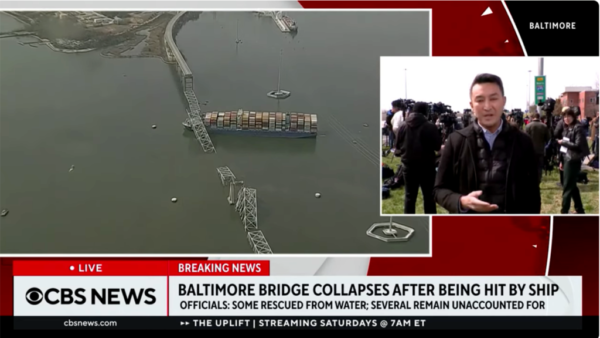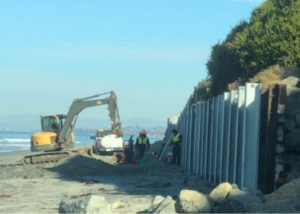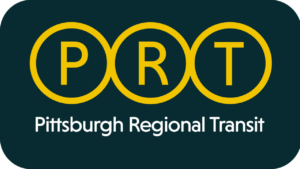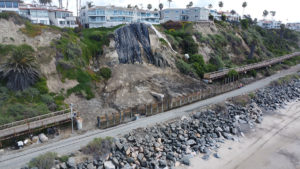Bridge Collapse Shuts Down Port of Baltimore — From Our Colleagues at Railway Age
Written by William C. Vantuono, Editor-In-Chief, Railway Age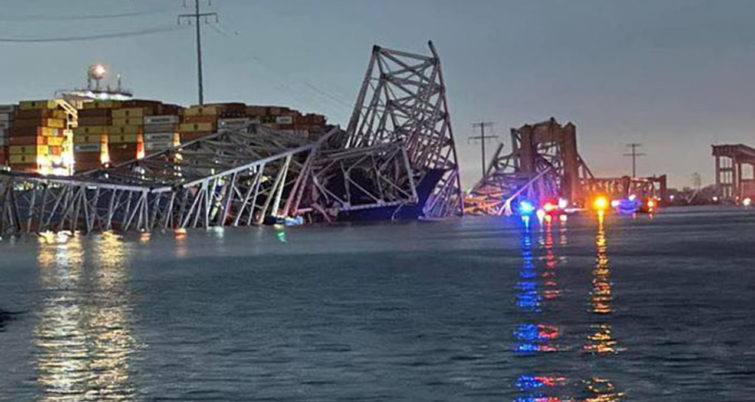
BALTIMORE - The tragic early morning collapse of the I-695 Francis Scott Key Bridge, which spans the Patapsco River, following a bridge strike by a container ship weighing 95,000 gross tons, has brought the Port of Baltimore, an important trade hub, to a halt. The Port of Baltimore has suspended all vessel traffic into and out of the port until further notice. The accident is a serious blow to the port operations of both CSX and Norfolk Southern, particularly for intermodal container, automotive and coal traffic.
The accident occurred at approximately 1:30 AM on March 26 when the Dali, a 10,000-TEU, 948-foot Singapore-flagged containership owned by Grace Ocean, chartered by Maersk and managed by Synergy Marine, crashed into a main pier of the 1.6-mile bridge after departing from the Port of Baltimore. The vessel was outbound to Colombo, Sri Lanka. Video released on YouTube appears to show the vessel briefly losing power before crashing into the bridge and causing it to collapse. Synergy Marine said all 22 crew members and the two harbor pilots on board had been accounted for with no reports of injuries.
The Dali’s crew told Baltimore Harbor Control that the vessel had lost power and propulsion a just before the ship struck the bridge. A mayday call enabled officials to stop traffic at both ends of the 1977-built structure and try to evacuate people from the span before it collapsed. Eight people are believed to have fallen into the water during the collapse; all were part of a construction crew filling in potholes. Six of those people are still missing. A search and rescue has been under way since shortly after the accident.
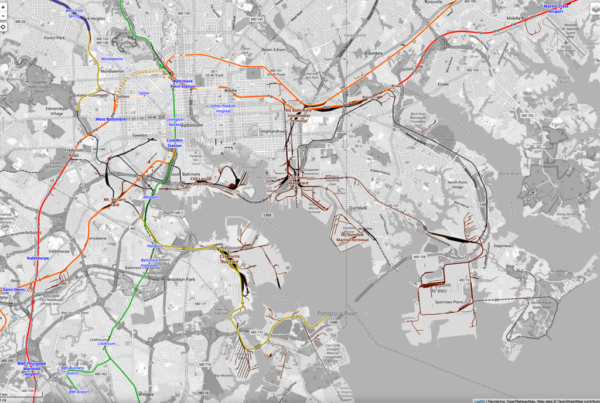
“CSX customers should anticipate potential shipment delays following the tragic collapse of the Francis Scott Key Bridge along I-695 in Maryland today,” CSX said in a statement. “While freight traffic has not been entirely halted in the region, certain commodities have been affected by the incident. CSX is actively communicating with customers to provide updates on their shipment statuses as the situation evolves.
“CSX currently has capacity to dispatch additional trains to CSX-served coal terminals in Baltimore before reaching pile space limits. Contingency plans are being implemented and CSX is in contact with existing coal customers through these terminals. The company currently intends to keep its Curtis Bay Coal Pier facility operational but will continue to assess the circumstances to determine appropriate actions moving forward.
“In light of the bridge collapse impacting vessel access to the port, all international intermodal shipments destined for Baltimore have been temporarily suspended. In-gated traffic originating from other locations and destined for Baltimore is on hold until further notice. The CSX team is working with International customers to identify alternative solutions to support cargo movement to and from Baltimore. It’s important to note that domestic intermodal traffic on CSX destined for local Baltimore remains unaffected. CSX is committed to keeping customers informed and will continue to provide updates as information becomes available.”
“Our hearts go out to the individuals and families impacted by the tragic events surrounding the Francis Scott Key Bridge collapse,” said CSX President and CEO Joe Hinrichs. “The State of Maryland and the City of Baltimore have been central to our operations for nearly two centuries, and we remain deeply connected to this dynamic region. We stand in solidarity with the community during this difficult time.”
Norfolk Southern told Railway Age it is assessing the impact on its operations and would be issuing a customer advisory shortly.
The Port of Baltimore handled a record amount of foreign cargo last year, and was the 20th biggest port in the nation overall in 2023, ranked by total tons, according to the Bureau of Transportation Statistics. It ranks first in the U.S. for the volume of automobiles and light trucks it handles and for vessels that carry wheeled cargo, including farm and construction machinery. About 40 ships, including 34 cargo vessels, currently have Baltimore listed as their destination, according to MarineTraffic, which tracks ships around the world. Global shipping analyst Georgios Hatzimanolis said he “expects there to be a ripple effect, but it’s a bit too early to say what the impact will be.”
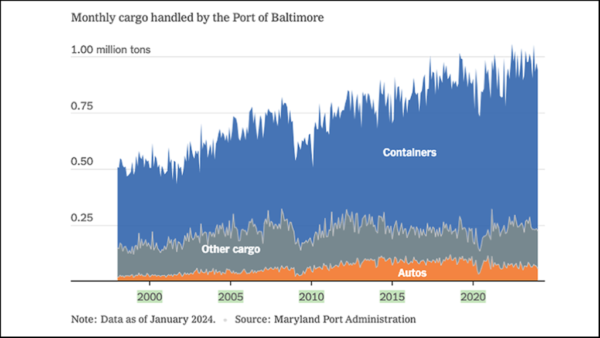
State-owned terminals managed by the Maryland Port Administration and privately owned terminals in Baltimore transported a record 52.3 million tons of foreign cargo in 2023, worth $80 billion. The port handled nearly 850,000 cars and light trucks last year, more than in any other U.S. port for the past 13 years. Other materials transported in large volumes through the port include coal, coffee and sugar. It was the ninth-busiest port in the nation last year for receiving foreign cargo, in terms of volume and value.
President Biden, in a White House press briefing, said the federal government would “pay for entire cost of reconstructing” the collapsed Francis Scott Key Bridge, adding that he hoped it would be rebuilt and reopened “as soon as humanly possible.” Maryland Governor Wes Moore declined comment on when port operations might return to normal, saying that the “exclusive focus is on saving lives, search and rescue.”
